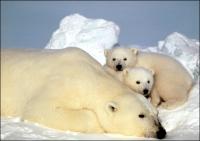A newly released US Geological Survey report shows that far fewer polar bear cubs are surviving off Alaska’s northern coast. While the decline in sea ice due to increased Arctic temperatures is not attributed as a cause in the study, according to Kassie Siegel at the Centre for Bilogical Diversity, an organization lobbying for polar bears to be designated as “threatened” under the Endangered Species Act, “it’s just another example of seeing all of the impacts that scientists have previously predicted come to pass.” The authors of the report recently observed polar bear deaths directly related to sea ice retreat, and concluded that, “these anecdotal observations, in combination with both the changes in survival of young and in physical stature reported here, suggest mechanisms by which a changing sea ice environment can affect polar bear demographics and the status of populations.”
Subscribe to our newsletter
Stay up to date with DeSmog news and alerts







